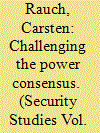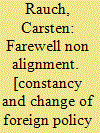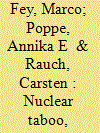|
|
|
Sort Order |
|
|
|
Items / Page
|
|
|
|
|
|
|
| Srl | Item |
| 1 |
ID:
155059


|
|
|
|
|
| Summary/Abstract |
Power Transition Theory (PTT) has hitherto often relied on power indicators like Gross Domestic Product (GDP) or the Composite Index of National Capability (CINC) to capture its power variable. The underlying assumption is that these indicators are highly correlated, and thus it matters little as to which one the researcher chooses. I call this PTT's power consensus and argue that this consensus is problematic, as the choice of power indicator is often crucial. For PTT, it does not only matter whether such indicators come to similar results by and large; the position of certain singular actors—such as the dominant power, its prime challengers, and the top ranked great powers generally—is even more essential. However, it is precisely with regard to the positions of these actors that we find important discrepancies between what PTT's favored indicators (GDP and CINC) suggest. Analysis of some crucial historical and recent cases supports my challenge to the power consensus. First, the celebrated peaceful power transition between the United Kingdom and the United States in the nineteenth century becomes suspect under closer scrutiny, as GDP places the United States entering the parity zone at a time during which it must arguably be counted as a dissatisfied power. Second, a number of CINC-exclusive power transitions in the twentieth century are not accounted for by GDP. A few possible options might mitigate the power-problem for the cases under scrutiny, however scholars of PTT should generally be much more conscious about their choice of power indicator.
|
|
|
|
|
|
|
|
|
|
|
|
|
|
|
|
| 2 |
ID:
085371


|
|
|
|
|
| Publication |
Germany, Peace Research Institute frankfurt, 2008.
|
| Description |
38p.
|
| Series |
PRIF report; no. 85
|
| Standard Number |
9783937829739
|
|
|
|
|
|
|
|
|
|
|
|
Copies: C:1/I:0,R:0,Q:0
Circulation
| Accession# | Call# | Current Location | Status | Policy | Location |
| 054080 | 327.10954/RAU 054080 | Main | On Shelf | General | |
|
|
|
|
| 3 |
ID:
147323


|
|
|
|
|
| Summary/Abstract |
The nuclear age has been characterized by an emerging and now well-established norm of nuclear non-use, the ‘nuclear taboo’. In the realistic and naturalistic setting of the science-fiction TV series Battlestar Galactica, however, nuclear weapons are used frequently and at times massively. Claiming that science fiction can function as an illuminating ‘mirror’ for international relations scholarship and that we can learn something from ‘second-order’ (fictional) worlds, this article explores potential in-show reasons that render the absence of a nuclear taboo plausible within the universe of Battlestar Galactica. We turn to the central pillars of the nuclear taboo in the real world and find them reversed in the show: nuclear weapons are (depicted as) ‘clean’, international institutions are absent, and the enemy is socially constructed as a ‘radical other’, thus rendering the possibility, if not likelihood, of nuclear war plausible. With these insights, we return to our world and argue that, particularly during the years of the George W Bush presidency, the erosion tendencies of the nuclear taboo were indeed quite serious: technological progress and growing political inclination expedited plans to develop usable nuclear weapons, arms control regimes came under considerable strain, and opponents were portrayed as ‘unjust enemies’ or ‘rogues’.
|
|
|
|
|
|
|
|
|
|
|
|
|
|
|
|
|
|
|
|
|